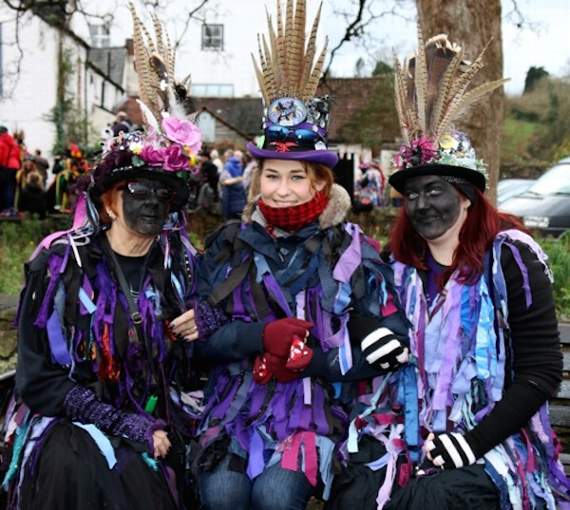AROUND 700 spectators braved the poor winter weather conditions last weekend to watch this year’s Chepstow Wassail Mari Lwyd.
The Chepstow Wassail Mari Lwyd is an annual event that combines the mainly English tradition of Wassailing, a traditional New Year’s celebration, and the celebrating of the Welsh midwinter Mari Lwyd tradition. It is a unique event which includes the meeting of the English and Welsh on the border, in the middle of the Old Wye Bridge. The festival acknowledged the changing of the seasons, using a ceremonial horse skull as a symbol of death and rebirth.
There was also Morris dancing and a Country Dance Ceilidh. The event was hosted by The Widders Welsh Border Morris, the local team and supported by Monmouthshire County Council, Chepstow Town Council, Chepstow Acoustic Music Club, Glosfolk and the people of Chepstow and abroad.
Monika Kudaseva, 23, from Lithuania but living in Newport, said: “It was a colourful, fun event with music and dancing from many different groups. There is a lot to learn about local history and traditional customs, and being a visitor to the United Kingdom I am eager to learn all about its diversity.”
There were 11 Mari-Lwyds at the event; a Mari is a person disguised as a horse, who goes from house to house singing in an attempt to bring people living there good luck. The mainly English tradition of the Wassailing involves the blessing of an apple tree in the hope of a good harvests.
A spectator at the event said: “What Mick Lewis has managed to do is introduce the new element of English Morris dancing sides attending, and having a spectacular meeting between the Welsh and English on the old bridge at 6.30pm. There was music, torches, drums, flags, and the English were brought ceremonially back into Wales for final dancing and Mari ceremony at the museum.
“I think this distinguishes it from other Mari ceremonies held, and unites old English and Welsh customs in a positive way.
“One such English side being Silhill Morris from the Solihull area, and also present this year were Styx of Stroud.”

Comments
This article has no comments yet. Be the first to leave a comment.